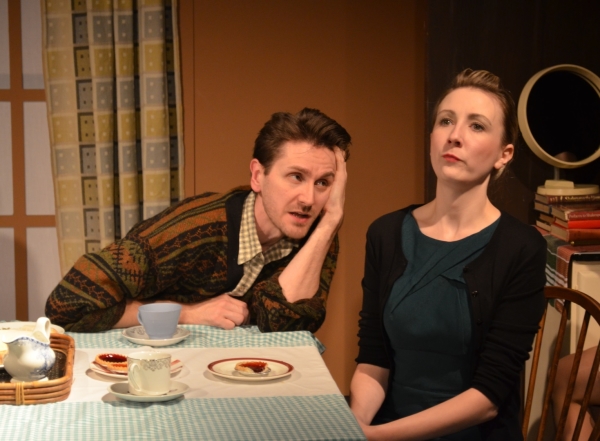Look Back In Anger (Alma Tavern Theatre)
A performance of ”Look Back in Anger” leaves one torn,confused and overwhelmingly angery in Red Rope Theatre Companies well acted production of Osborne’s game changer.

© Red Rope Theatre Company
A witty dialogue and a presumption that the protagonist’s anger-inducing comments are not reflective of his creator’s views are what carry Look Back in Anger by John Osborne. The character of Jimmy is near impossible to warm to. Manipulative and self-centred, the disillusioned and perpetually angry university graduate is bitter and discontent with what life has given to him and, like all too many people, he chooses to take out his anger on those closest to him. His inability to empathise with anyone else leaves him cruel and heartless towards his demure and withered wife, Alison, stating his dislike of women on a regular basis.
The Alma Tavern in Clifton is an ideal venue to host Look Back in Anger. Small and insignificant in its décor, the cosy atmosphere complements the piece well. However, despite ithe plays historical significance, I find this performance very difficult to truly enjoy. The continuous ranting nature of Jimmy versus the uninterrupted martyring of Alison is downright draining. This monotony is only briefly watered down by the kindness provided to the couple by their unusual friend Cliff, the lodger.
Albeit an excellent script, by the time the interval arrives, I find myself frustrated and depleted – and more than ready to go home to bed! However, the show must – and does – go on and the second half does leave you slightly less exasperated than the first. I would hasten to add that the performances from the Red Rope Theatre Company are delivered with great ease and are a very competent impersonation of their characters’ difficult natures. In fact, I would go as far as to claim that the actors are far better than the play itself.
On a political note, the production speaks volumes. Set in a cramped attic in the Midlands, the show highlights the attitudes and lifestyles of many British citizens in the post-imperial age. Osborne was one of the first writers to address working-class Britain’s discontent during this time, questioning the point of the monarchy and emphasising the dismissal of official attitudes and the drift towards anarchy. In this way, the play is a very interesting study of current political attitudes and their origins.
The end of the performance leaves me torn, confused and overwhelmingly angry that one person could set out to willingly and foolishly torment so many people as a result of their discontent for their own lives. I am supposing that this is the purpose of the play, to teach that whilst we must never settle for less than we are deserving of, we should also not blame those around us for our own choices.
If you are easily wound up by unending disgruntlement, from a character crushed by the weight of history, class and post-war austerity this probably isn’t the play for you. However, whilst not necessarily an enjoyable experience, the witty script and interesting character studies will engage you on a social and political level, leaving you somehow glad that you endured the trying nature of the plot.












